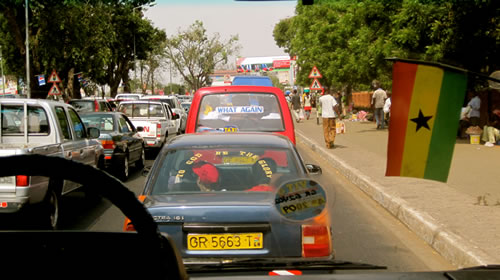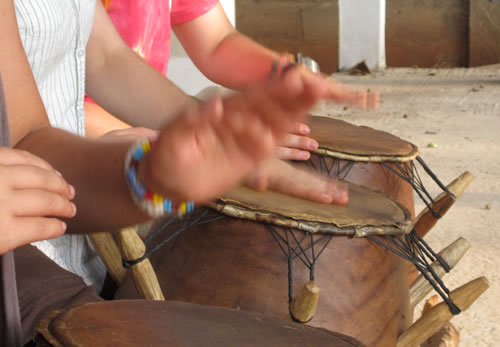Study Abroad in Ghana with SIT
Open Your Imagination to New Cultural Experiences
Article and photos by Isabel Dickinson

|
|
School Children in the village of Benim, Ghana.
|
First Impressions of Ghana
After traveling for nearly two days, I had finally made it. My air flights, which took me from Los Angeles to New York, New York to Frankfurt, Germany, and Frankfurt to Accra, Ghana, left me bleary-eyed and cramped. I almost did not believe I was there when I tumbled down the plane's stairs at the tiny Accra Kotoka Airport (ACC) into the humid afternoon air. My new environment seemed a world away from my hometown in California, and I had not even left the airport.
I felt so lost walking through customs, so how was it that when I walked out of the arrival section of the airport to find Kokroko, one of SIT's program directors, standing alone with a cardboard cut out scribbled with the three letters of "SIT" was I so comforted? From this first encounter, I found that the people of Ghana are some of the most gracious and welcoming I have ever met. Whether taking time to walk you to your next destination if you have found yourself lost or offering to share their meal with you, even if you are not an acquaintance, Ghanaians' hospitality is touching. One difficulty I had from the beginning of my experience living in Ghana was connected to the understanding that it would be almost impossible for me to fit in. I was always labeled as the "Obruni," meaning foreigner.
My first impression of Accra was that it was crowded and hot. The air felt thick, and so was the traffic. I certainly did not mind the traffic, however, as I was enthralled by the people selling anything from plantain chips (fried, thinly sliced, and salted plantains) to wind-up mice and toilet paper right against our tro tro window. I soon learned that a tro tro is a type of public transportation most commonly used in Ghana for short and long journeys. Although many programs state that they are based in Accra, the capital of Ghana, many are truly based in Legon, a suburb of Accra. It is much less crowded, fewer streets are paved, and it takes at least 40 minutes by tro tro to reach downtown Accra. However, where most students are stationed, the University of Ghana is located in Ghana. It boasts a gorgeous campus with excellent professors.

|
|
Tro tro ride from the airport.
|
SIT Arts and Culture Immersion Program
One of the most interesting aspects of the SIT program is that we had the resources of the University of Ghana at our fingertips. Still, we were able to travel with the program directors' guidance. We stayed with three different families in three areas: Accra, Kumasi, and a small village approximately two hours away from Kumasi. For one month after our three consecutive homestays, we traveled with the group from Kumasi to Tamale for a week of lectures and a weekend stay at Mole National Park. From Tamale, we traveled through Ghana to Cape Coast, the capital of Ghana before Accra, for just over a week. Finally, we traveled to the Volta region and then back to Accra for our final 1-month independent research period. The program gave all 15 students the freedom to experience Ghanaian culture independently but, at the same time, a structure to enable these experiences.

|
|
Baboon Crossing, Mole National Park.
|
Through the program, each student experienced an extreme amount of cultural immersion. To a certain extent, we were all thrown into our homestay family's home with very little knowledge about the culture and what to expect. We were told never to use our left hands, as it is seen as a huge insult to any Ghanaian receiving a left-handed gesture, and how to greet our elders in Twi, one of the 49 languages in Ghana, for which we had an intensive 4-week class. Our 3-day orientation before home stays prepared us as much as possible for life in a completely foreign culture, but it never seemed enough. That is the program's point: learn as you go, and you will never forget.

|
|
Drum Lessons in Accra.
|
The SIT program includes drum lessons, an intensive 2-week dance class followed by a graded performance, and multiple craft lessons, including pottery, batik, jewelry, and adinkra symbols. All of these are hands-on and outside of the classroom. One crucial thing that the SIT Arts and Culture program taught me during my semester abroad is that some of the most valuable learning happens outside of the classroom. I created yards of batik fabric, glass and clay beads, and ceramics. I learned how to drum and dance to traditional West African music.
An significant portion of the semester with SIT is dedicated to a month-long individual research assignment of the student's choice. This is an excellent opportunity for a student to independently research a topic of their choice in a destination for an extended period. Despite being the most rigorous part of the semester, it is also the most rewarding. I have come out of this program with an entirely new outlook on life. As a student in the United States, I am so fortunate for my education and opportunities. It is almost impossible to travel to a country like Ghana, fully immerse in their culture for an entire semester, and not take away a significant amount of confidence in yourself and your ability to obtain anything. This period in my life has been unforgettable. I hope others will have a similar chance to experience a different culture.
Living in Ghana
The transportation system in Ghana is based primarily on large vans called tro tros. Fares are extremely low, about 50 cents for a 20-minute trip, but they can often be crowded, and it is hard to catch them during rush hour. Rush hours vary depending on which city you are in. However, if you are studying at the University of Ghana, Legon, the hardest time to catch a tro tro is between 7 and 9 a.m. and 4 and 6 p.m. The roads are often unpaved, making for a bumpy ride, but it is always an adventure. Taxis are available, but they are such a high price to pay when the tro tros are so inexpensive. Tro tros tend to stop running by 1 a.m. So, if you are traveling late at night, it is best not to wait at the stop for hours but to pay the extra fare to get home. Traveling between the larger cities is easy but very time-consuming. A tro tro from Cape Coast to Accra — two popular destinations — takes around three hours, but all on paved roads and costs only about 3 cedi, or $2. Traveling alone is safe, and you will no doubt make friends along the way. I preferred not to travel alone very much after dark, but when it was necessary, I never felt threatened. If anything, more people helped me after dark than during the daytime.
The Food in Ghana
The food is one of the cultural features I could only begin understanding towards the end of my semester. Food is not necessarily a social ritual for most Ghanaians. However, it is becoming more and more common to share a meal as Ghana becomes more Westernized. Do not be surprised if your host families do not eat with you, as mine rarely did. It was difficult for me to eat in Ghana as a vegetarian. Although beautiful fruits and vegetables are growing everywhere, the diet of most Ghanaians is starch-based, mostly plantains, rice, yams, and ground corn. I could buy the most delicious fruits, including avocado, mango, pineapple, coconut, oranges, and bananas. Still, I needed help finding vegetables to eat on the spot, as you must peel and wash all fruits and vegetables before consumption. One of Ghana's most widely produced products is ground nut paste, more commonly known as peanut butter, and it is absolutely delicious. It is essential to try the traditional Ghanaian dishes — and most can be prepared without meat — because many Ghanaians swear by them. Two popular dishes are fufu, ground and pounded corn, and banku, ground, pounded, and fermented corn. Both are served with either pepper sauce or a stew. There seems to be a controversy throughout Ghana about which dish is better. You might have to decide for yourself, but my favorite is banku.
Dressing and Hygiene Customs in Ghana
Hygiene and dressing well are important to many Ghanaians. However, the protocol for showering, dressing, and going to the bathroom is very different. Bucket showers in cold water are the norm, and it is surprisingly easy to adapt to the experience. Many people in Ghana are either Christian or Muslim, and most Muslims live in the northern areas of Ghana. It is essential to dress appropriately in Northern Ghana, and it is recommended that most students wear something to cover their hair. In the southern regions, dressing just a little more conservatively is fine. However, it depends upon the crowd with which you travel. As international students and travelers, it is essential to represent your country well. However, many of the younger people in Ghana have taken to dressing in mini skirts and tank tops. It is hard to judge others as they live in their own culture, but it is also important to dress in a way that makes you feel comfortable.
Isabel Dickinson is a junior music major at Wesleyan University in Connecticut. Her concentration is Ethnomusicology, especially in the ever-growing impact of globalization on world music. Although Isabel is very interested in world music, she is classically trained in the cello. She is an active participant in many music groups on the Wesleyan campus. Isabel was born and raised in Santa Barbara.
|
